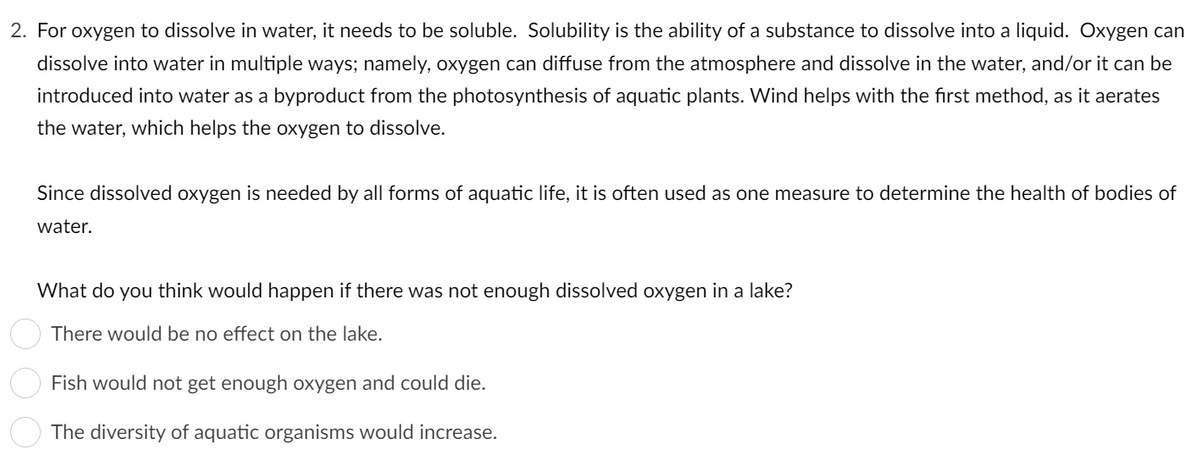For oxygen to dissolve in water, it needs to be soluble. Solubility is the ability of a substance to dissolve into a liquid. Oxygen can dissolve into water in multiple ways; namely, oxygen can diffuse from the atmosphere and dissolve in the water, and/or it can be introduced into water as a byproduct from the photosynthesis of aquatic plants. Wind helps with the first method, as it aerates the water, which helps the oxygen to dissolve. Since dissolved oxygen is needed by all forms of aquatic life, it is often used as one measure to determine the health of bodies of water. What do you think would happen if there was not enough dissolved oxygen in a lake?
For oxygen to dissolve in water, it needs to be soluble. Solubility is the ability of a substance to dissolve into a liquid. Oxygen can dissolve into water in multiple ways; namely, oxygen can diffuse from the atmosphere and dissolve in the water, and/or it can be introduced into water as a byproduct from the photosynthesis of aquatic plants. Wind helps with the first method, as it aerates the water, which helps the oxygen to dissolve. Since dissolved oxygen is needed by all forms of aquatic life, it is often used as one measure to determine the health of bodies of water. What do you think would happen if there was not enough dissolved oxygen in a lake?
Principles of Modern Chemistry
8th Edition
ISBN:9781305079113
Author:David W. Oxtoby, H. Pat Gillis, Laurie J. Butler
Publisher:David W. Oxtoby, H. Pat Gillis, Laurie J. Butler
Chapter15: Acid–base Equilibria
Section: Chapter Questions
Problem 98AP
Related questions
Question

Transcribed Image Text:2. For oxygen to dissolve in water, it needs to be soluble. Solubility is the ability of a substance to dissolve into a liquid. Oxygen can
dissolve into water in multiple ways; namely, oxygen can diffuse from the atmosphere and dissolve in the water, and/or it can be
introduced into water as a byproduct from the photosynthesis of aquatic plants. Wind helps with the first method, as it aerates
the water, which helps the oxygen to dissolve.
Since dissolved oxygen is needed by all forms of aquatic life, it is often used as one measure to determine the health of bodies of
water.
What do you think would happen if there was not enough dissolved oxygen in a lake?
There would be no effect on the lake.
Fish would not get enough oxygen and could die.
The diversity of aquatic organisms would increase.
Expert Solution
This question has been solved!
Explore an expertly crafted, step-by-step solution for a thorough understanding of key concepts.
Step by step
Solved in 2 steps

Knowledge Booster
Learn more about
Need a deep-dive on the concept behind this application? Look no further. Learn more about this topic, chemistry and related others by exploring similar questions and additional content below.Recommended textbooks for you

Principles of Modern Chemistry
Chemistry
ISBN:
9781305079113
Author:
David W. Oxtoby, H. Pat Gillis, Laurie J. Butler
Publisher:
Cengage Learning

Chemistry: Principles and Reactions
Chemistry
ISBN:
9781305079373
Author:
William L. Masterton, Cecile N. Hurley
Publisher:
Cengage Learning

Chemistry & Chemical Reactivity
Chemistry
ISBN:
9781337399074
Author:
John C. Kotz, Paul M. Treichel, John Townsend, David Treichel
Publisher:
Cengage Learning

Principles of Modern Chemistry
Chemistry
ISBN:
9781305079113
Author:
David W. Oxtoby, H. Pat Gillis, Laurie J. Butler
Publisher:
Cengage Learning

Chemistry: Principles and Reactions
Chemistry
ISBN:
9781305079373
Author:
William L. Masterton, Cecile N. Hurley
Publisher:
Cengage Learning

Chemistry & Chemical Reactivity
Chemistry
ISBN:
9781337399074
Author:
John C. Kotz, Paul M. Treichel, John Townsend, David Treichel
Publisher:
Cengage Learning

Chemistry & Chemical Reactivity
Chemistry
ISBN:
9781133949640
Author:
John C. Kotz, Paul M. Treichel, John Townsend, David Treichel
Publisher:
Cengage Learning

Chemistry: Principles and Practice
Chemistry
ISBN:
9780534420123
Author:
Daniel L. Reger, Scott R. Goode, David W. Ball, Edward Mercer
Publisher:
Cengage Learning

General Chemistry - Standalone book (MindTap Cour…
Chemistry
ISBN:
9781305580343
Author:
Steven D. Gammon, Ebbing, Darrell Ebbing, Steven D., Darrell; Gammon, Darrell Ebbing; Steven D. Gammon, Darrell D.; Gammon, Ebbing; Steven D. Gammon; Darrell
Publisher:
Cengage Learning